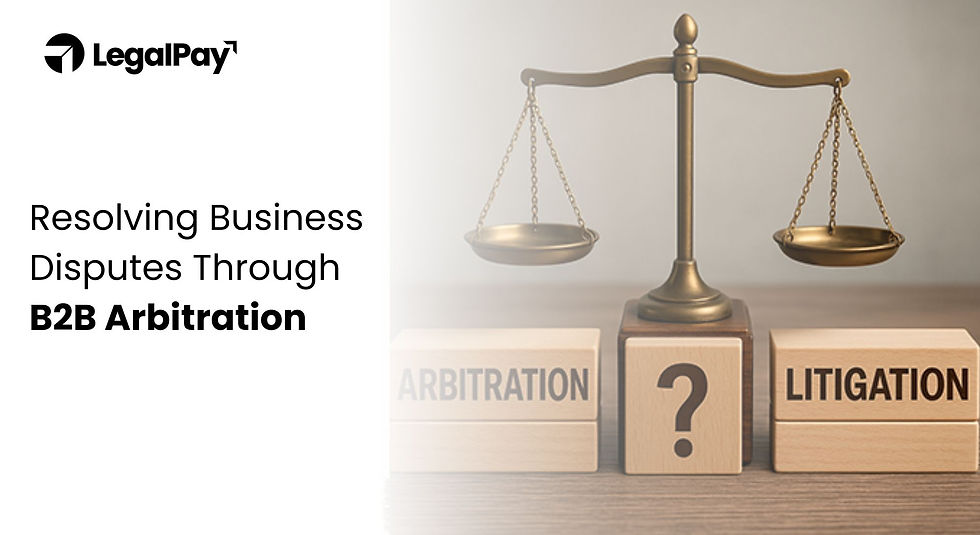Litigation Financing in Real Estate: Empowering Property Owners in Ownership Disputes
- LegalPay

- Nov 29, 2023
- 3 min read
Property ownership is a fundamental right in India, but it is often challenged by various factors such as inheritance disputes, fraudulent transactions, encroachments, and unclear titles. These disputes can drag on for years in the courts, draining the resources and energy of the rightful owners. How can property owners in India protect their interests and pursue their claims without compromising their financial stability? One possible solution is litigation financing, a novel concept that enables property owners to access funds from third-party investors to cover the legal costs of their disputes. Litigation financing can help property owners in India fight for their rights and obtain justice in a fair and efficient manner.
Understanding Litigation Financing:
Litigation financing, also known as legal funding or third-party litigation funding, involves obtaining financial assistance from external sources to cover the costs of legal proceedings. This funding can be used to pay legal fees, court costs, expert witness fees, and other expenses associated with litigation. In real estate cases, litigation financing can prove particularly beneficial, given the high-stakes nature of property disputes.
For e.g. A financially constrained Indian family embroiled in a land ownership dispute seeks litigation financing from a specialized third-party funder. After assessing the case's viability, the funding provider offers financial assistance to cover legal expenses. The family and the funder agree on terms, including repayment and a share of potential settlement. This support enables the family to pursue a fair resolution in court and illustrates how litigation financing promotes access to justice in real estate ownership conflicts.
Advantages of Litigation Financing in Real Estate Ownership Disputes
1. Access to Justice
Litigation financing helps level the playing field between property owners involved in ownership disputes and powerful adversaries. Property owners, especially individuals or smaller businesses, might not have the financial resources to sustain a long legal battle. Litigation financing ensures they have the means to fight for their rights without succumbing to financial pressure.
2. Mitigation of Financial Risk
Real estate litigation can be an expensive endeavour. By securing litigation financing, property owners can mitigate the financial risk associated with pursuing their claims. If the case is unsuccessful, they typically are not required to repay the financing, shifting the risk to the financing entity.
3. Access to Top-Quality Legal Representation
Litigation financing allows property owners to hire experienced and competent attorneys who specialize in real estate litigation. This ensures that their case is handled by professionals with the expertise and knowledge needed to navigate the complex legal landscape of property disputes.

4. Timely Resolution
Financial backing from litigation financing enables property owners to proceed with legal actions promptly. Delaying legal action due to financial constraints can adversely affect the outcome of the case. With timely intervention, property owners can work towards a faster resolution and potentially save on additional costs.
5. Preservation of Assets
Property owners can protect their assets and investments by accessing litigation financing instead of depleting their savings or selling off valuable properties to fund legal battles. This ensures that their financial stability and assets remain intact during the litigation process.
Considerations and Caution
While litigation financing can be a valuable resource for property owners involved in real estate ownership disputes, it's crucial to approach this option with caution. Here are some considerations:
Understand the Terms: Property owners should thoroughly review and understand the terms and conditions of the litigation financing agreement, including the repayment structure and potential costs.
Assess the Cost-Benefit Ratio: Evaluate the cost-benefit ratio of obtaining litigation financing, considering the potential outcomes of the case and the associated costs of financing.
Consult Legal Counsel: Seek advice from legal professionals before entering into any financing agreements to ensure it aligns with your best interests and legal strategy.
Conclusion
Litigation financing is a promising option for property owners in India who face complex and costly real estate disputes. It can provide them with the financial resources to access quality legal services, pursue their rightful claims, and achieve faster and fairer outcomes. By transferring the costs and risks of litigation to a third-party funder, property owners can balance the power dynamics and reduce the uncertainties of litigation. They can also focus on their core business activities and avoid the stress and distraction of legal disputes. However, litigation financing is not a magic bullet, and it comes with its own challenges and limitations. Property owners should be aware of the legal and ethical implications of litigation financing, such as the potential conflicts of interest, loss of control, and disclosure obligations. They should also carefully evaluate the pros and cons of entering into such agreements, such as the fees, terms, and conditions of the funding arrangement. They should seek expert legal advice and negotiate the best possible terms with the funders. By doing so, property owners can make informed and strategic decisions, and use litigation financing as a valuable tool to protect their interests and rights.




Comments